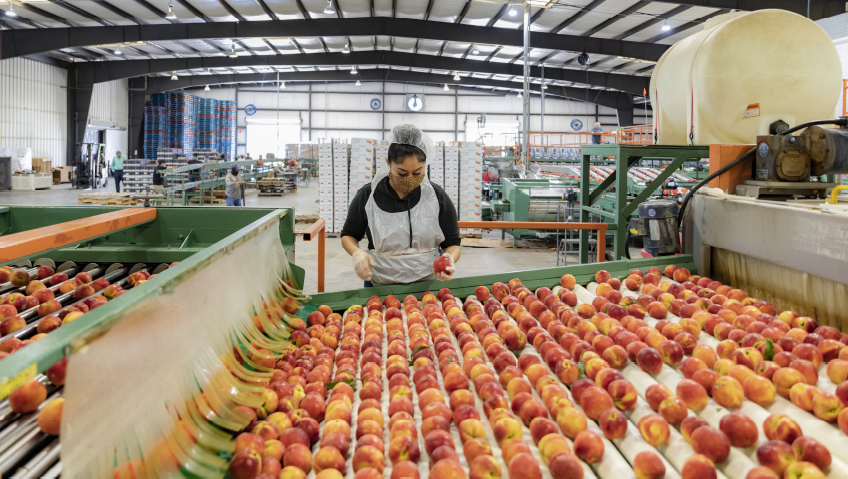Healthy, resilient supply chains – of food and other goods – are of the utmost importance to national security. PECO Pallet is a leader in quality pallet supply that helps North America run like clockwork.
Is PECO Pallet America’s brightest pallet pooler today? With its lively red pallets to be seen here, there, and everywhere throughout North America’s warehouses, clients are left with no second-guessing about who their supplier is, whether in Mexico, Canada or the U.S.A.
Red has always stood for passion, speed, and dominance – three perfect descriptors for this dynamic company. With its American base in Irvington, New York, and the Canadian outfit headquartered in Mississauga, Ontario, the company’s closed-loop pallet operation comprises well over 2000 recovery points, more than 40 depots, and a similar number of sorting zones across North America.
And its quality is as easily recognizable as its signature color. Every pallet is made according to the strictest specifications with 26 slats and just short of 140 fasteners guaranteed per full-sized unit.
To date, PECO Pallet has been lauded for affordable prices, sterling service, and as a forward thinker given to setting trends. This translates to a reputation for coming to market with novel value propositions. Like being the driving force behind the rising popularity of box pallets that is slowly causing a drop in the use of stringer pallets throughout Canada – making it a pioneer of using block pallets exclusively in closed-loop pallet pooling.
The popularity of block pallets seems easily justifiable when moving them around as they are built to be more easily movable by forklifts or when transported on trailers. Furthermore, PECO’s superior quality is achieved by using only responsibly harvested wood dried in kilns, which mitigates issues like fungus, insect infestations, etc. Treating the wood in this manner enhances its durability.
Before the block pallets are dispatched back into the rental circuit, every unit passes through a rigorous 15-point inspection executed by specialized technology that includes the lasers, cameras, and 3D scanners that make up the company’s Vision-X system.
This happens on every single return trip through the depot. It may sound like a very intense process to the uninitiated, but those in the industry fully understand the time and wastage that occurs when poolers deliver substandard pallets.
PECO Pallet has literally millions of its instantly recognizable block pallets in circulation throughout North America, but it nevertheless handles all movement of its own pallets, including those returning from their final destination to its depot where they submit to the rigorous testing and cleaning process.
Considering the scale on which the company operates, this is a gargantuan task, even for as highly tuned and efficient a company as PECO.
For the sake of precision, it is therefore imperative that clients’ needs are thoroughly ascertained and followed up with relevant feedback and problem-solving discussions. With logistics running hot through this company’s veins, it is a field that the PECO Pallet team excels at. Flexibility and responsive customer care form a fundamental part of its ethos.
Rigging its entire operation for optimum accuracy at all times is one of the company’s mainstays to ensure that no time at all is wasted in getting pallets organized and on the road for clients in high-pressure industries. To ease the process, PECO side-stepped the common call-center business model in favor of assigning each client their own specific consultants responsible for dealing with all their orders and shipments.
The company first started doing business in 1997 as the Pallet Exchange Company, which name soon yielded to the acronym of PECO that’s in use today. The company was the brainchild and combining of forces of nearly 20 pallet recyclers, fabricators, and brokers, each, at that time, running their own operation.
They were all seasoned in the trade and had a common vision – that they could make a genuine, competitive impact by synchronizing and improving the control and distribution of pallets. PECO Pallet developed and introduced its pooling model in Canada in 2013.
With supply chain management being under severe pressure during 2020’s lockdown measures, the superior service and technology that the company offers has brought tremendous returns in terms of client satisfaction. Not surprising, as the benefits of choosing PECO pallets include reduced conveyor and palletizer pile-ups, safer racking zones, less packaging, improved product safety, cheaper storage, and less time spent in circulation by the pallets.
In terms of the significant savings reported in an independent study led by Canada’s Poirier Group (TPG), distributors can avoid wasting nearly US$500,000 annually by opting for block pallets over stringer pallets. As PECO Pallet notes in a press release, this impressive amount comprises over US$440,000 in transport charges, as well as nearly US$57,000 in improved operational effort.
Also, based on a report by Freedonia (the expectation of a nearly two percent increase in pallet distribution by the end of 2019), the numbers were projected to show over 2.5 million new pallets entering the market in Canada alone.
The logistics news provider, inboundlogistics.com, in 2017 identified two reasons for the sharp increase projected by analyst Kyle Peters of Freedonia. An increase in consumer goods shipped from manufacturers, plus the upgrade of old pallets that had not been phased out due to the recession of 2017/2018, were given as the main contributors to the projection.
While a marked move toward using restored over brand-new pallets is also noted, business projections are looking particularly favorable for PECO Pallet with its sterling offering.
In December 2020, DC Velocity reported a tremendous rise in the demand for better quality rental block-pallets. PECO Pallet was ready to answer the call and it filled the gap in the market with its great quality, easy-stack pallets.
With such superb timing, we will no doubt soon see good news about its successful handling of the COVID-19 crisis.






